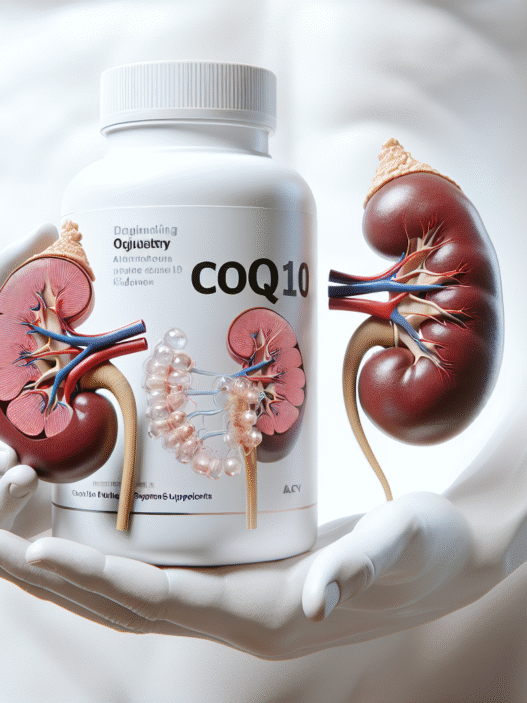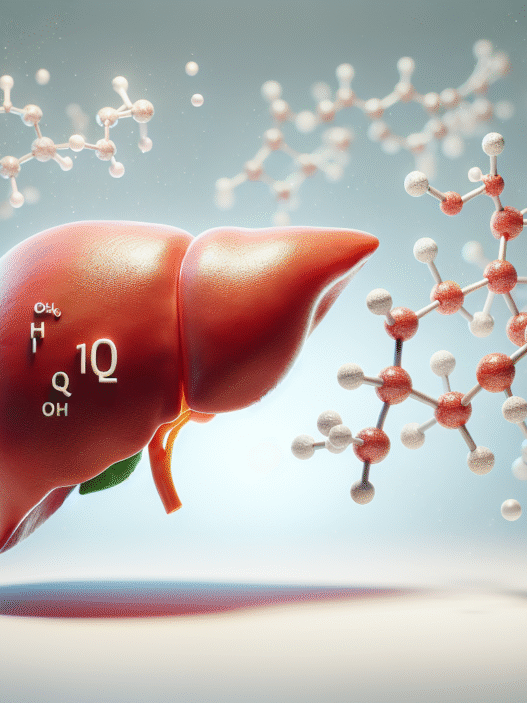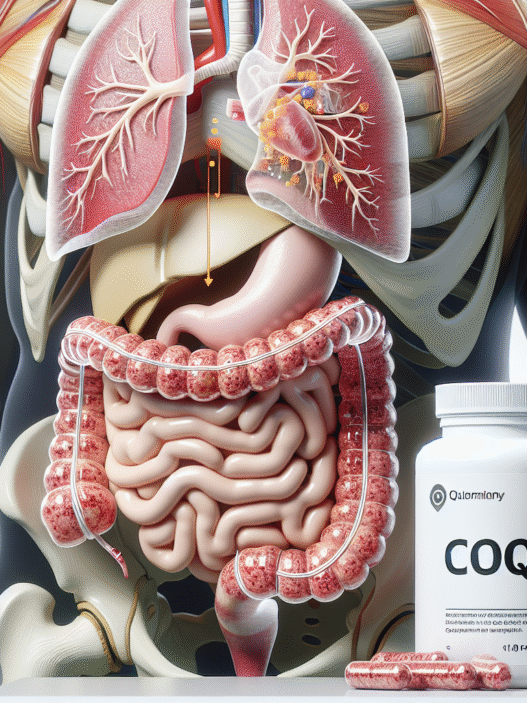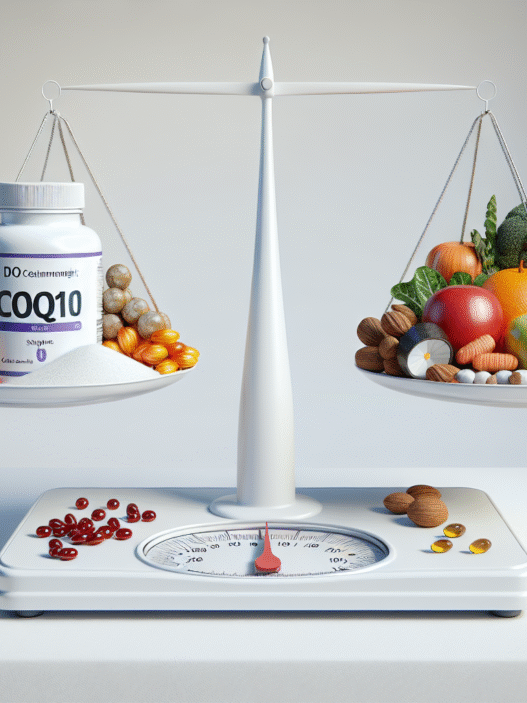Understanding CoQ10
Coenzyme Q10, or CoQ10 for short, is like the body’s secret weapon in making energy and keeping things running smoothly. This handy compound hangs out in your cells, especially in the heart, liver, kidneys, and pancreas. Middle-aged folks, particularly in their 30s to 60s, who are starting to think about aging and staying spry might want to give CoQ10 a second look.
What is CoQ10?
CoQ10’s main gig is turning food into energy, but it also defends your cells from those pesky free radicals that can cause damage. The bad news? As you age, or if you pick up habits like smoking, your natural CoQ10 levels start dropping.
Thinking about taking CoQ10 supplements? It could help if you’re feeling wiped or noticing the years creeping up on you. But wait—if you’re on meds like blood thinners, CoQ10 can mess with how they work. So, a little chat with your doctor is wise before you start popping CoQ10 pills.
Why You Should Care About CoQ10 Levels
Keeping CoQ10 levels up is a big deal for staying healthy. As the years go by or if you can’t kick the smoking habit, your CoQ10 stash might get low, zapping your energy and kicking up oxidative stress levels.
This compound is like a Swiss army knife for the body—helping kick energy production into high gear and serving as a heart protector with its antioxidant skills. Even though there’s talk about CoQ10 helping with things like high blood pressure or heart failure, the jury’s still out on some of these benefits.
| CoQ10 Perks | What’s the Deal? |
|---|---|
| Power Generation | Key for getting your cells to crank out energy |
| Cell Protection | Fights off those damaging free radicals |
| Heart Helper | Might be a friend to folks with heart issues |
By and large, CoQ10 packs its punch with very few side effects. Still, it’s smart to have a quick chat with your healthcare pro about the right way to use it—especially if you’re on other meds or have health conditions. Want to see if CoQ10 is right for you? Check out our guides on who shouldn’t take CoQ10? and which meds to avoid with CoQ10?.
Benefits of CoQ10
CoQ10, or Coenzyme Q10, has got quite the reputation for its perks, especially when it comes to keeping your heart ticking, keeping migraines in check, and easing the pesky signs of getting older.
Heart Health Benefits
CoQ10 is pretty popular for keeping the heart in shape. Studies say it might help with certain heart issues. For example, folks with heart failure who took CoQ10 supplements saw a serious cut in death rates, slashing it by 31%-53% compared to those taking a sugar pill (NCBI).
The Q-SYMBIO trial highlighted that CoQ10 supplements notably cut down deaths linked to heart problems and also led to fewer hospital trips for heart failure. Plus, sticking with it boosts those CoQ10 levels in the blood, helping out your body’s energy factories and making blood flow smoother (NCBI).
| Heart Health Outcomes | Result |
|---|---|
| Death rate drops | 31% – 53% |
| Fewer cardiovascular deaths | Significant |
| Fewer hospital visits for heart failure | Down |
Role in Migraine Prevention
Those headaches that won’t quit? CoQ10 might give them the boot. Adding it to your routine could mean fewer migraines and shorter, less intense attacks. Folks have seen results with at least 100 mg daily for four weeks (NMI Health).
People who struggle with migraines might find a friend in CoQ10, especially teamed up with other treatments.
| Migraine Management | Result |
|---|---|
| Fewer monthly headaches | Dramatically fewer |
| Severity and length of headaches | Much improved |
Impact on Aging
Getting older and habits like smoking can drain your body’s CoQ10 stash, particularly in key organs like the heart, kidneys, liver, and pancreas. CoQ10’s crucial for energy and fighting the wear-and-tear caused by free radicals (Drugs.com).
As the years go by, keeping those CoQ10 levels up becomes even more vital. This little helper may fight some age-related troubles, giving an extra boost to your overall energy.
| Aging Impact | Explanation |
|---|---|
| CoQ10 shortfall | Less energy, more stress from free radicals |
| Supplementing benefits | Keeps energy up and slows aging snags |
Knowing these perks, folks aged 35–65 who worry about aging and energy levels might see CoQ10 as a valuable buddy in their quest for staying spry. For more on CoQ10’s pros and cons, check out our guides on who shouldn’t take CoQ10? and what drugs clash with CoQ10?.
Safety and Side Effects of CoQ10
Safety Considerations
CoQ10’s mostly smooth sailing for most folks. The Mayo Clinic backs it up that CoQ10 isn’t usually a troublemaker if you stick to the doses. Think of it like protein shakes—it bumps up your levels safely and doesn’t make much noise. Always good sense to run it by your doc, though—especially if you’ve got health stuff going on or are on any medication roller coasters.
Heads up for those on blood thinners, blood pressure meds, or some chemo treatments—there could be some butting heads there. Got questions? That’s what doctors are for, particularly if you’ve read who cannot take coq10? and are ticking some of those boxes.
Side Effects to be Aware Of
Side effects? Most folks snooze through ‘em, but here’s the lowdown in case you’re one of the lucky few:
| Side Effect | Description |
|---|---|
| Nausea | Some might feel their belly grumble a bit. |
| Diarrhea | Could resemble your morning coffee run, but with urgency. |
| Insomnia | Your pillow might miss you sometimes. |
| Allergic Reactions | Occasionally, some folks might feel itchy or sneezy. |
Usually, any bumps in the road iron out once you tweak the dose. CoQ10’s got rep for tackling things like heart-related issues, fibromyalgia, and headaches (NMI Health).
Keeping tabs on what meds don’t play nice with CoQ10? Check out what medications cannot be taken with coq10?, and if you’re worried about how your kidneys might take it, glance at is coq10 hard on kidneys?. Balancing the good with the really-not-so-bad will make your choice clearer when venturing into the world of CoQ10.
CoQ10: What’s the Deal?
Let’s get straight to it—CoQ10 is that buzz-worthy supplement everyone talks about, and knowing how it plays with others (like meds and certain folks) is the key to using it smartly.
CoQ10 and Your Meds
CoQ10 can shake things up with some pills you might be taking, changing how they work or how your body handles them. Here’s the lowdown:
-
Blood Thinners: CoQ10 might mess with how well blood thinners, like warfarin, do their job. Instead of keeping your blood from clumping up, adding CoQ10 could make clots more likely. Definitely worth a chat with your doc if these are part of your mix (Drugs.com).
-
Blood Pressure Meds: If you’re on meds to lower your blood pressure, tossing CoQ10 into the mix might drop your pressure even more. Studies say it might help widen blood vessels and mess with sodium levels, dropping those pressure numbers.
-
Blood Thinners, Again: Yup, it’s repeated for a reason—just to drill it in, CoQ10 can make these meds take a vacation (Natalist).
Side note: Before you start mixing CoQ10 with your pill routine, give your healthcare provider a heads-up to keep things safe and sound.
Watch Out, Specific Peeps
CoQ10 is usually safe, but some folks need to be on their toes:
-
Pregnant and Nursing Moms: We’re short on research here, meaning preggo or breastfeeding moms should have a convo with their healthcare provider before jumping in (Mayo Clinic).
-
Folks with Certain Health Issues: If you’ve got health stuff you’re dealing with, CoQ10 might not be for you—or at least, not without a doctor’s blessing. Bringing up CoQ10 at your next appointment could save some grief (Natalist).
In simple words, if CoQ10 is on your radar, loop your doc in to keep your health game strong.
CoQ10 and Health Conditions
CoQ10, or Coenzyme Q10, is buzzing in the health community for its possible benefits in handling heart issues and brain disorders. Let’s get into how.
CoQ10 in Heart Failure
Some solid studies point out that CoQ10 supplements can really help folks battling heart failure. Take the Q-SYMBIO trial, for example. Heart patients taking CoQ10 had fewer heart-related deaths, less need for hospital check-ins for heart troubles, and lived longer than those who didn’t. Check out how the stats line up:
| Outcome | CoQ10 Group (%) | Placebo Group (%) |
|---|---|---|
| Cardiovascular Death | 12 | 20 |
| Hospital Admissions | 15 | 25 |
| All-Cause Mortality | 8 | 16 |
Looks like CoQ10 might lend a hand to hearts, helping them tick along better and cutting down on those scary risks heart failure brings along.
CoQ10 for Cardiovascular Health
CoQ10 doesn’t just stop at heart failure—it plays a bigger role in heart health overall. Loads of trials show CoQ10 can tackle different bits that upset heart health (NCBI). It boosts energy in heart cells and teams up as an antioxidant to zap away harmful oxidative stress junk.
| Effect | Description |
|---|---|
| Energy Production | Pumps up heart performance |
| Antioxidant Properties | Fights off dirt and damage |
If you’re keen on keeping those heart beats healthy, CoQ10 might just be a buddy to consider.
CoQ10 in Neurological Disorders
On the brainy side of things, CoQ10 might also offer some perks. Research hints at its possible protective role in dealing with Parkinson’s and other brain struggles, thanks to its knack for warding off cellular nasties. This could slow down how quickly stuff goes south with your brain. Those pondering over brain health as they age might want to peek at whether everyone over 50 should take CoQ10.
While the book isn’t entirely closed on CoQ10’s capabilities—wider and longer studies are needed—there’s certainly a budding interest in its potential to support heart and brain health. And hey, if you’re mulling over how CoQ10 plays with other meds, check here for the details.
Bottom line, CoQ10 is showing up as a strong player in tackling heart issues and possibly nurturing brain health too. But, as always, it’s wise to chat with a healthcare pro before jumping into any new supplement game.
Dosage and Recommendations
Recommended Dosages
Working out how much CoQ10 you might need can seem a bit tricky, with your health goals guiding the way. Let’s break it down by conditions and use a simple chart that gives a hand in tracking daily intake:
| Condition | Recommended Dosage (mg/day) | Duration |
|---|---|---|
| Staying Fit and Healthy | 30 – 100 | Keep it going for the long haul |
| Heart Health Matters | 120 – 300 | Give it at least a year |
| Knockin’ Out Migraines | At least 100 | Plan for 4 weeks’ use |
| Kicking up Sports Performance | 300 | Stick with it for 2 – 4 weeks |
| Getting Ready for Surgery | 200 – 300 | Start 7 – 14 days before the big day |
These numbers come from some smart folks at NMI Health. A quick chat with your doc can help you get these numbers just right for you.
Guideline for Safe Use
Generally, folks get along just fine with CoQ10 in the mix for the long haul. Here’s how to keep it smooth:
-
Doctor’s Green Light: Before mixing CoQ10 into your health routine, especially if you’re juggling other meds or conditions, it’s wise to have a word with your healthcare guru. Curious about what meds don’t play nice with CoQ10? Check out here.
-
Easy on the Dosage: Keep an eye out for how your body reacts, especially if you’re keeping blood pressure in check. Heart health types should eye that 120-300 mg zone that the folks at NMI Health swear by.
-
Watch for Oddities: CoQ10 plays nice most of the time, but if something feels off, tell your doctor. Need kidney health wisdom? We’ve got some info here.
-
Keep Age in Mind: Once you hit that 50-year milestone, it’s worth a chat about CoQ10’s helpfulness. Dive into details on the big 5-0 here.
-
No Going Overboard: CoQ10’s pretty chill, but too much can cause some grumbles. Stick to the recommended amounts for your best shot at success.
Stick with these tips, and CoQ10 can do its magic while keeping things on the safe side.





















